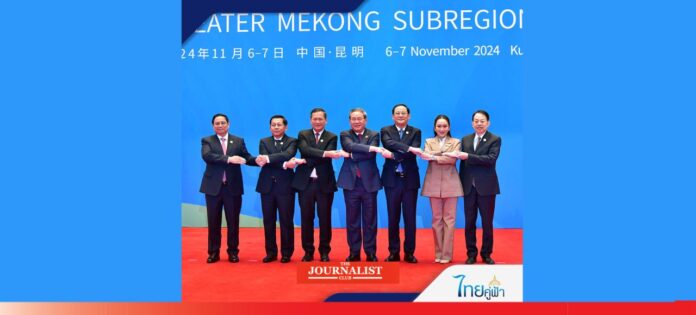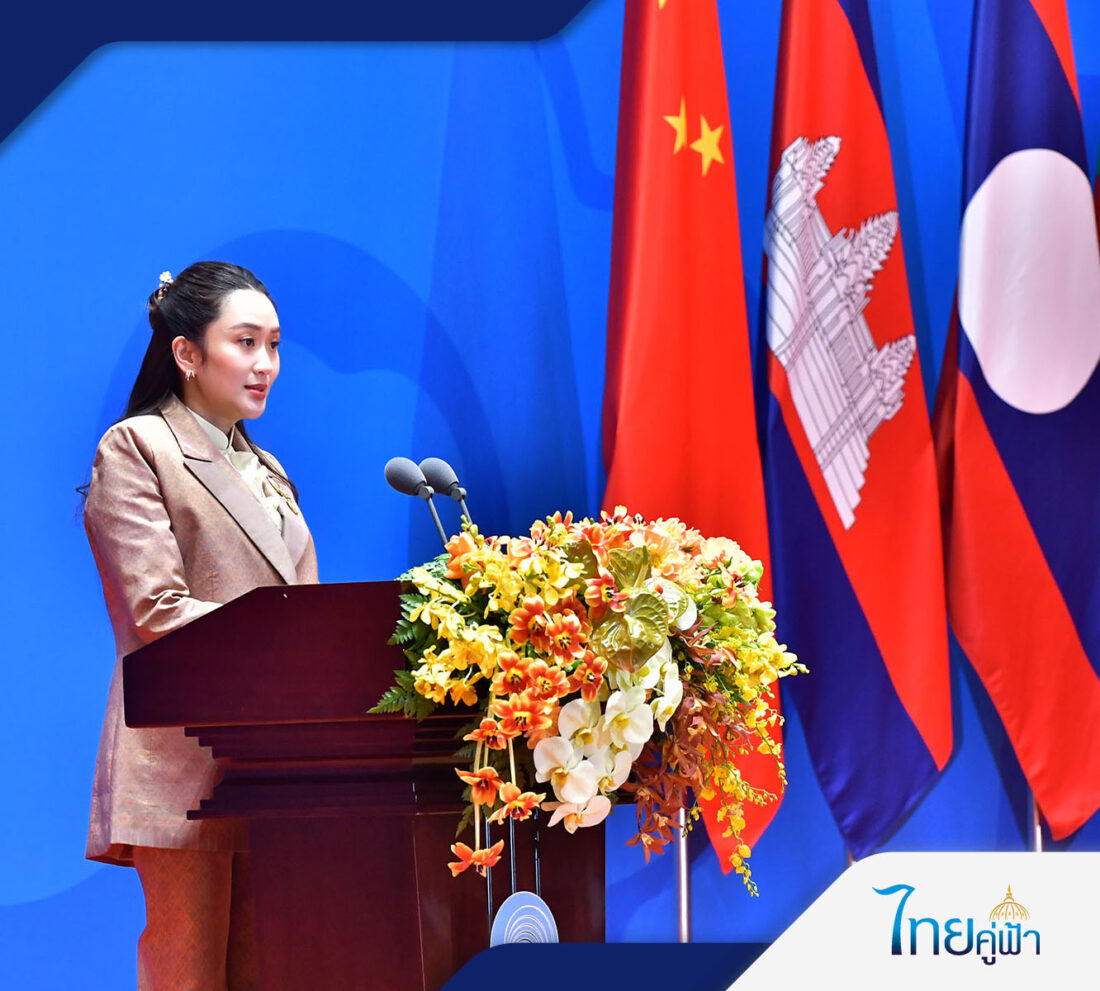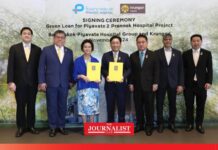

Prime Minister Paetongtarn Shinawatra delivered a statement inthe 10th Ayeyawady – Chao Phraya – Mekong Economic Cooperation Strategy (ACMECS) Summit that Thailand is ready to host the ACMECS officials’ meeting at the first opportunity to determine systematic position on water management.

Thailand has proposed to add a concept note on water resource management in the Mekong River Basin to the ACMECS Master Plan’s appendix as a guideline for strengthening cooperation and increasing efficiency in both short and long-term water management.
“Thailand is ready to host the ACMECS officials’ meeting at the first opportunity to determine systematic position on water management, and leverage all cooperation frameworks in the subregion.” PM Paetongtarn addressed in the meeting.
Natural disasters resulting from the climate change. Last September, Typhoon Yagi has affected more than 5 million people in the subregion, with economic damages estimated at US$16.6 billion. The Prime Minister took the opportunity to express condolences over the loss caused by flood disaster in Cambodia, Lao PDR, Myanmar, and Vietnam over the past couple of months, and emphasized the importance of water management in the subregion, the forefront issue of the moment.
At the meeting, two outcome documents have been adopted, namely, the Vientiane Declaration for the 10th ACMECS Summit, and the Concept Note on water resource management in the Mekong River Basin to be added to the ACMECS Master Plan’s appendix (proposed by Thailand).
PM Paetongtarn delivered a statement at the 10th Ayeyawady – Chao Phraya – Mekong Economic Cooperation Strategy (ACMECS) Summit, which was chaired by Prime Minister of Lao PDR, and attended by Prime Ministers of Cambodia, Myanmar, and Vietnam. ACMECS was organized in Yunnan, China on November, 7.
It has been 21 years since 2003 that Thailand initiated and co-founded ACMECS with confidence in the economic potential of the Greater Mekong Subregion. ACMECS today, with its abundant natural resources, strategic location as a “bridge” connecting the Indian and Pacific Oceans, and its increasingly important role in promoting connectivity within ASEAN and across regions, is growing like young people full of hope and energy to reap benefits and develop in a sustainable manner.
ACMECS advanced a connectivity during the past 4 years
Under the vision of “Seamless ACMECS to promote seamless connectivity” ACMECS has significantly advanced during the past 4 years thanks to the development of infrastructure and transportation routes, both land, water and air.
Thailand managed to fill missing links in the subregion through road construction for the East-West Economic Corridor (EWEC) and the Southern Economic Corridor (SEC), and to promote cooperation at the local level through the Luangprabang – Indochina – Mawlamyine Economic Corridor (LIMEC).
The country also focuses on economic synergizing through facilitating and promoting border trade, improving trade and investment regulations (e.g., cross-border transport regulations under the GMS plan), and promoting sustainability and innovations through human resource development and the use of modern technology to empower new-generation entrepreneurs.
Over the past two years, Thailand has provided scholarships and trainings to over 100 personnel in member countries. Thailand will continue to implement skill development projects in Cambodia, Lao PDR and Myanmar to ensure that “our sub-region grows with no one left behind.”
The PM also took pride in Thailand’s major role to drive ACMECS in various dimensions, especially when the country has been entrusted as the location of temporary ACMECS secretariat, a liaison office and central mechanism for key strategic planning.
Welcoming of New Zealand as ACMECS’ 7th development partner
Public awareness on ACMECS has been promoted through the launch of the ACMECS logo and website. Welcoming of New Zealand as ACMECS’ 7th development partner also reflectedthe importance and potential of ACMECS cooperation.
The five member countries are neighbors with adjacent borders.All member countries enjoy close and mutually beneficial relations, share common interests and potentials in various areas, while also facing common challenges, such as, transboundary crime, air pollution, and natural disasters resulting from the climate change. The PM urged that member countries work together under the ACMECS framework to identify the most effective solutions to those problems.
Thailand also proposed two approaches to address the various challenges under the ACMECS framework as follows:
First is transnational crime, especially drugs trafficking and cybercrimes. According to the report of United Nations Office on Drugs and Crime, 170 tons of methamphetamine and 22 tons of ketamine have been seized in Southeast Asia in 2023. Likewise, cybercrime has also emerged as a significant threat in the subregion. During the period of March 2023 to March 2024, Thailand’s economic damage was reported to be over US$1.8 billion.
Thailand encouraged member countries to leverage mechanisms under various cooperation frameworks, such as, the Safe Mekong Operation, in intercepting the import of precursors and chemicals, suppressing production, import, export and trafficking of drugs, and strengthening and developing cooperation in related areas. Regular meetings of relevant agencies were also proposed.
Hopes to solve air pollution
Air pollution, especially PM 2.5 particulates. This time of the year sees a resurgence in air pollution problems. More than 200 million people in the subregion, or 650 million people in Southeast Asia, live in areas with air pollution levels higher than WHO recommendations, reducing life expectancy by around 1.5 years and increasing the number of people diagnosed with respiratory diseases.
Thailand committed to work together with member countries to reduce hotspots under the Chiang Rai 2017 Plan of Action. On October 29, Thailand, together with Lao PDR and Myanmar, held a ceremony to launch the “Clear Sky Strategy” as a model for joint operation to address transboundary haze problem, in accordance with Chiang Rai 2017 Plan of Action, for the region to become haze-free by 2030.
ACMECS should expedite the establishment of ACMECS Development Fund to immediately address these challenges and mobilize fund for the development of projects under the ACMECS Master Plan.
Thailand reaffirmed its commitment to support the Fund and sincerely hoped that consensus on the Fund’s management mechanism could be reached by the first quarter of 2025 to enable projects that generate tangible results. The Prime Minister also extended an invitation for member countries and development partner countries, as well as potential countries, international organizations, and financial institutions, to provide support to the fund to promote sustainable development of the Mekong Sub-region.
Relate News : Good opportunity of Prime Minister Paetongtarn Shinawatra to learn on being a leadership at 44th and 45th ASEAN Summits.










